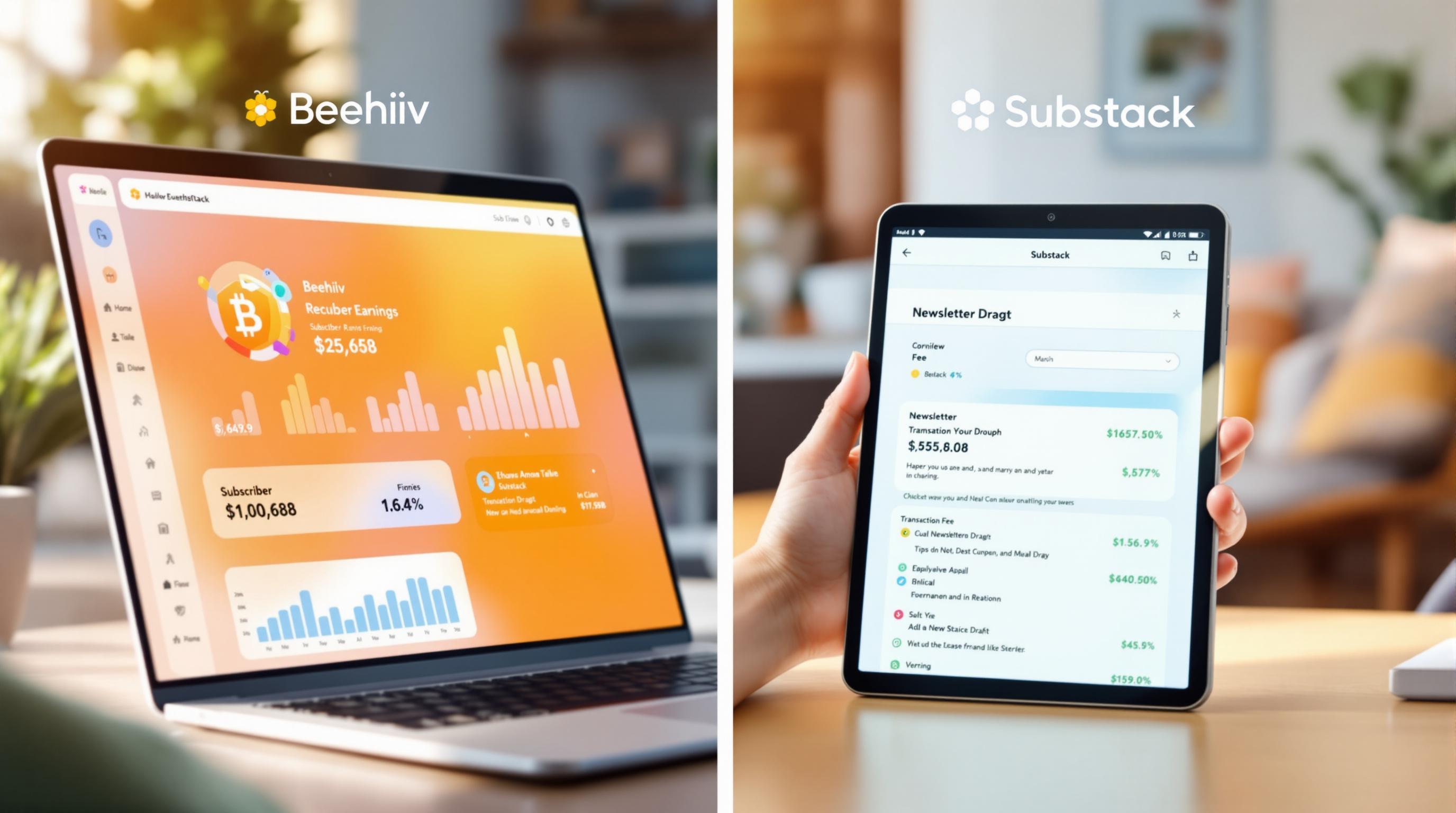Beehiiv and Substack are two popular platforms for managing newsletters, but they cater to different needs. Here's a quick breakdown:
- Beehiiv: Best for fast-growing newsletters. It offers advanced automation, detailed analytics, and fixed pricing, making it ideal for scaling. Features like smart segmentation, API integrations, and multiple revenue tools help manage large audiences effectively.
- Substack: Focuses on simplicity and community building. It’s great for smaller newsletters or those just starting out. Features like native commenting, subscription management, and a built-in content network make it easy to grow organically. However, its revenue-sharing model can get expensive as your income increases.
Quick Comparison
| Feature | Beehiiv | Substack |
|---|---|---|
| Pricing | Fixed tiers based on features | 10% revenue share for paid newsletters |
| Automation | Advanced (welcome sequences, triggers) | Basic (welcome email, post alerts) |
| Analytics | Detailed (cohort analysis, custom reports) | Simplified (basic metrics) |
| Revenue Tools | Sponsorships, subscriptions, affiliates | Subscription payments |
| Community Features | Limited | Strong (comments, content network) |
| Scalability | Built for large-scale operations | Better for gradual growth |
Key Takeaway: Choose Beehiiv if you’re scaling quickly and need advanced tools. Opt for Substack if you prefer simplicity and are starting small. Both are great options, but the right choice depends on your growth goals and budget.
Beehiiv Vs Substack: Which Is Better For Newsletters?
Beehiiv and Substack: Core Features
Beehiiv and Substack both aim to support newsletter growth, but they take different approaches with their core features.
Beehiiv's Growth Tools
Beehiiv is built to help newsletters scale effectively, offering tools designed to expand reach and streamline operations. Some of its standout features include:
| Feature | What It Does | How It Helps Growth |
|---|---|---|
| Smart Segmentation | Automatically groups subscribers based on engagement | Allows for personalized content targeting |
| Revenue Tools | Offers sponsorships, subscriptions, and affiliate tracking | Creates multiple income streams as your audience grows |
| API Integration | Provides API access for custom integrations and automation | Connects easily with other tools and workflows |
Beehiiv also ensures reliable email delivery with built-in spam protection and delivery optimization. This makes it well-suited for handling large-scale newsletters. Unlike Substack, Beehiiv emphasizes automation and technical flexibility.
Substack's Publishing System
Substack takes a different route, focusing on content creation and building a strong reader community. While it doesn't offer as much automation, it provides tools that encourage organic growth:
| Feature | What It Does | How It Helps Growth |
|---|---|---|
| Discussion Tools | Includes native commenting and community features | Boosts reader interaction and loyalty |
| Payment Processing | Handles subscriptions and recurring billing seamlessly | Simplifies earning revenue as your audience expands |
| Content Network | Promotes newsletters within Substack's ecosystem | Opens up organic growth through cross-promotion |
Substack's approach prioritizes simplicity and a content-first mindset. While Beehiiv leans on automation and customization for rapid scaling, Substack focuses on fostering a loyal audience. Your choice will depend on the specific needs of your newsletter.
Technical Performance and Capacity
Managing growing traffic and high email volumes requires efficient systems. Both Beehiiv and Substack rely on cloud-based infrastructures, but their technical performance has some nuances worth noting.
Server Performance
While both platforms utilize cloud-based servers, specifics about how they handle traffic surges, allocate resources, or ensure redundancy aren't publicly available. Without uptime statistics or performance benchmarks, it's hard to draw direct comparisons between the two.
Email Sending Capabilities
For publishers with expanding subscriber lists, dependable email delivery is a must. However, neither platform provides detailed information about key aspects like batch processing, rate limits, or concurrent email sending. This makes it challenging to pinpoint differences in their email delivery systems.
To choose the right platform, publishers should consider their unique requirements, future growth plans, and feedback from other users. For a broader comparison of newsletter tools, check out Newsletter Platform Comparison.
Next, let’s dive into how automation and segmentation features help these platforms manage growing audiences.
sbb-itb-2653e19
Subscriber Tools and Automation
Managing subscriber relationships gets trickier as newsletters expand. Both Beehiiv and Substack provide tools to help with automation and segmentation, making it easier to handle growing audiences.
Audience Segmentation Tools
Beehiiv allows you to segment your audience based on factors like engagement, location, and subscription type. Substack, on the other hand, offers simpler segmentation, focusing mainly on distinguishing free subscribers from paid ones.
Email Automation Systems
Beehiiv's automation features include:
- Welcome sequences with multi-step onboarding
- Engagement triggers that respond to reader actions
- Re-engagement campaigns to win back inactive subscribers
- A/B testing for refining content performance
Substack offers a more straightforward approach to automation, featuring:
- A single welcome email for new subscribers
- Tools for scheduling publications
- Automated alerts for new posts
These differences in automation become more noticeable for larger newsletters, where tailored engagement can play a big role in keeping subscribers. When deciding between Beehiiv and Substack, consider how much control you need over subscriber management and automation. Next, let’s take a look at how each platform handles tracking growth metrics.
Growth Tracking and Metrics
Tracking and analyzing performance is key to growing your newsletter effectively. Both Beehiiv and Substack provide real-time analytics to help you monitor progress and make adjustments as needed.
Live Performance Data
Beehiiv offers real-time insights into crucial metrics like open rates, click-throughs, and subscriber growth. Its dashboard is designed to give you a clear picture, making it easier to tweak your strategies on the go.
Substack also delivers live metrics, focusing on post views, subscription changes, comments, and basic revenue details. Its interface is simple and straightforward, prioritizing ease of use over in-depth analytics.
Here’s a quick comparison of their live data tracking features:
| Feature | Beehiiv | Substack |
|---|---|---|
| Real-time tracking | Broad insights across multiple metrics | Focused on essential metrics |
| Data visualization | Detailed and comprehensive | Simplified and minimal |
| Revenue reporting | In-depth revenue details | Basic revenue overview |
Advanced Analytics Options
Beehiiv offers advanced tools like cohort analysis and customizable reports, making it easier to dive deep into subscriber behavior. Substack, on the other hand, provides monthly growth trends and basic demographic information.
Both platforms allow you to export data for external analysis. Beehiiv’s more detailed analytics give newsletter managers the ability to refine their content and monetization strategies as their audience grows, making it a strong choice for those aiming to scale effectively.
Costs for Growing Newsletters
After evaluating performance and automation, pricing becomes a key consideration for expanding newsletters. Choosing the right platform can have a big impact on your budget as your audience grows.
Platform Price Comparison
Beehiiv uses a tiered pricing system based on features rather than subscriber count. Substack, on the other hand, operates on a revenue-share model. While Substack doesn't charge platform fees for free newsletters, paid newsletters incur a percentage-based fee on subscription revenue, along with standard payment processing charges. This means costs are minimal for smaller audiences but can increase significantly as revenue grows.
Growth Plan Features
Beehiiv's advanced plans are built for scalability and often include:
- Custom domains to maintain brand identity
- API access for integration with external tools
- Advanced analytics to understand subscriber behavior
- Priority support for technical issues
- Collaboration tools to support growing teams
Substack offers a simpler, single-tier setup where all users get access to its core features. These include built-in payment processing, tools for fostering community (like discussion boards), and exposure to its larger reader network.
For newsletters with fast-growing subscriber bases, Beehiiv's fixed pricing might be more budget-friendly over time compared to Substack's percentage-based fees, which increase as earnings rise.
Conclusion: Platform Selection Guide
Based on the technical details and cost breakdowns above, here's a quick guide to help you choose between Beehiiv and Substack. The right platform depends on your newsletter's current stage and future goals.
Go with Beehiiv if you:
- Are scaling quickly and need predictable costs
- Require advanced automation and segmentation features
- Want API integration and detailed analytics
- Prefer fixed costs, no matter how much your revenue grows
- Need flexibility for technical customizations
Opt for Substack if you:
- Want a simple, easy-to-use platform
- Value built-in tools for community engagement
- Are okay with a revenue-sharing model
- Want access to an existing network of readers
- Are just starting out with your newsletter
For example, a newsletter earning $10,000 monthly would pay about $1,000 in fees on Substack (10% revenue share). Meanwhile, Beehiiv's advanced plan offers a fixed rate, which could save you money as your revenue increases.
When deciding, consider these three key factors:
- Growth speed: How quickly you plan to scale
- Technical requirements: Your need for automation and customization
- Cost structure: Fixed pricing versus revenue sharing
Keep in mind that switching platforms becomes harder as your subscriber base grows, so picking the right one from the start is critical for long-term success.


